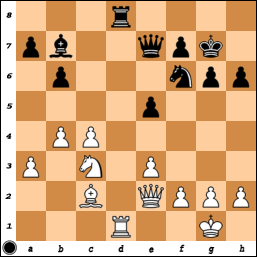 The World Cup final between Svidler and Karjakin was a comedy of errors. We can have lots of fun when the big boys blunder. It’s also very easy to criticize them for their bad moves.
The World Cup final between Svidler and Karjakin was a comedy of errors. We can have lots of fun when the big boys blunder. It’s also very easy to criticize them for their bad moves.
Of course it’s very convenient when we are sitting behind our computer and get some help from Fritz, Houdini or Komodo (of course 9.2!).
But what happens when we are sitting behind the board and smell the sweat from our opponents? Very likely we fare far more worse.
I have seen it happen time and time again. When things go wrong, they tend go very wrong. It seems that nothing can stop us on our road to self destruction. See the first diagram. See what happened (not for the faint hearted!)
Spells of chess blindness
I am not the only one suffering from spells of complete chess blindness. See the second diagram. After a game where both sides played decent moves – we only committed several inaccuracies – black was gradually getting the upper hand. We enter the fray after black’s 18th move.
In the second example the first mistake was a simple oversight. Maybe caused by the fact that white did not have a good plan and started to move his pieces aimlessly around? But this doesn’t explain the second, even worse, mistake. I guess that after a big mistake we are so upset, that we can’t think straight anymore.
There were many more examples of chess blindness. Happily: I left the honor most of the time to my opponents. Since the above mentioned dissaster I only lost one game. The question is what can we do to avoid such terrible mishaps? Or: how can one stop the rot?
Is there a cure?
When you notice you have made a mistake (or worse), it might be a good idea to take a mental time out. Maybe even walk away from the board for a couple of minutes. Stop cursing yourself and try to forget about what happened and concentrate on the position that is now in front of you. That is the only thing that matters. What happened before is not relevent anymore. Ask yourself:
‘What is the most stubborn defense?’
Or to phrase it slightly different:
‘How can you make as much problems for your opponent as is possible?’
And above all: forget about cheap tricks. They usually don’t work. The problem with cheap tricks is that they are cheap. It is very likely that your opponent is not going to fall for it. Another problem with cheap tricks is that you mostly embark on a forced sequence. It makes life for your opponent so much more easy. The chance that people make mistakes is far bigger when there are no forced moves! When things get a bit fuzzy.
Just think: ‘Hey buddy, you think you are winning? Fine, try to win it, but I will make your life as miserable as possible!’
 You will pick up a lot off half and whole points. See the last diagram. White is clearly much better. He is up a pawn and has the better position. But he did not win. He lost in the end. How? See what went wrong…
You will pick up a lot off half and whole points. See the last diagram. White is clearly much better. He is up a pawn and has the better position. But he did not win. He lost in the end. How? See what went wrong…
